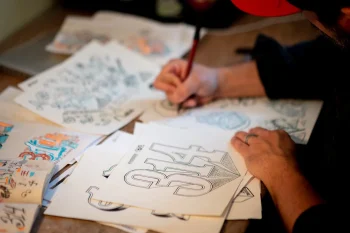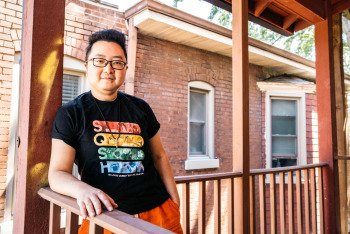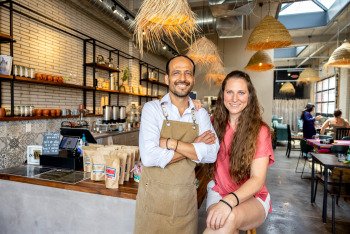Worldwide Pride
Julio Zegarra-Ballon’s colorful fair trade merchandise supports artisans around the globe with a living wage.
It’s a quiet morning, well before the start of the business day, and Julio Zegarra-Ballon is reflecting on the moments that led him to open two St. Louis stores that specialize in unique, hand-crafted fair trade products. Almost tearfully, he looks around Zee Bee Market, his eyes taking in the colorful dresses that were crafted in India and the measuring spoons sporting quirky black cats that were made in Vietnam.
But when Zegarra-Ballon looks at the items in his shop, he doesn’t simply see things to sell — he sees opportunity for all.
He’s memorized the stories of the people around the globe who have created these wares — how their living wage paid for education, health insurance, for peace of mind, for dignity. And he knows that by sharing those stories with his customers, he’s having a direct impact on the artisans’ lives.
“I am convinced that if more people in the city know about fair trade, more people will make a choice and say, ‘If my dollars can actually have a positive impact in the lives of other people around the world, why wouldn’t I want to do it?’” Zegarra-Ballon suggests.
In St. Louis, Zegarra-Ballon finds a region full of shoppers who are eager to make a difference via their purchases. And through his own journey into fair trade — first as a nonprofit volunteer and later as a merchant — he’s strengthened his conviction that it’s possible to make a living by doing what speaks to his heart.
Zegarra-Ballon’s path to becoming a fair trade advocate began with a love story in Peru. After meeting and marrying his American wife in his home country, he moved with her to the United States and took a job in retail — something he thought would be temporary but evolved into a full-fledged career, thanks to his economics degree and his ease with the English language.
But his own dreams were brewing, and entrepreneurship called. As Zegarra-Ballon continued to advance through the retail industry, he pursued an MBA from University of Missouri – St. Louis to build upon his business knowledge and start preparing for a new path.
It wasn’t long before Zegarra-Ballon found his spark, thanks to his volunteer sessions with the St. Louis-based nonprofit Partners for Just Trade, an organization dedicated to ethically connecting producers in poorer countries with consumers in the United States. Soon, Zegarra-Ballon began thinking about how a fair trade supply chain might look in his own future business. When merchants buy fair trade items to sell, he learned, they directly support producers from around the world with a living wage, unlike in a conventional supply chain model where factories produce products without paying artisans and workers fair prices. Fair wages have a huge impact in countries like Peru, Haiti and Cambodia, covering the cost of shelter, education, clothing and medicine.
“I recognized almost immediately that if a customer is given the choice to either buy something that is mass produced in a conventional supply chain or the same item that has been handcrafted lovingly by a human being in an impoverished country, you can make a difference,” Zegarra-Ballon says. “Your purchase power actually makes a difference in the world.”
St. Louis surely could support that, he thought.
That realization was transformative, and Zegarra-Ballon couldn’t wait to put these life-changing products into the hands of St. Louisans. With support from his wife and two daughters, he invested $1000 in fair trade goods as a test — if he saw a decent response when selling the items at Tower Grove Farmers Market, he could make a go of this. He bought a small table and set up shop for a few weekends as Zee Bee Market, named by one daughter for the initials in his last name.
Zegarra-Ballon’s debut was a hit. St. Louisans loved the products and the fair trade story resonated, so he continued to sell — every weekend.
“Every single week there was a mini success story,” he recalls. “I would come home full of energy because I was able to connect with more people and sell more products.”
It was the push he needed. After a few rounds at the farmers market, he opened his first full shop in a small storefront on Grand Boulevard. Surrounded by conscientious shoppers and many of St. Louis’s most popular immigrant-owned restaurants, Zegarra-Ballon felt like he was in the right place for success.
“We source products from about 33 different countries,” Zegarra-Ballon notes. “There’s scarcity today in St. Louis of truly genuine fair trade stores. When customers come in and they love what they see, I say, ‘Oh, by the way, the person behind the product is really benefiting from this transaction. We are stopping modern slavery.’ That is what I believe people want and crave.”
Zegarra-Ballon was right. Today, he owns two stores — the original on South Grand and a newer shop in Maplewood — because his customers keep returning to buy messenger bags constructed from discarded cement sacks, coat hooks fashioned from bike chains and colorful, polished soapstone hearts. Now a member of the Fair Trade Federation, he believes this is the catalyst to increase the region’s accessibility to fair trade goods and to share what he’s learned in his trips to the countries where his wares are created.
But Zegarra-Ballon is quick to point out that he’s not in this alone. As someone who came to the United States from Peru, Zegarra-Ballon has developed a local network of colleagues and friends who have helped make Zee Bee Market a reality.
“We need to be able to embrace the diversity that the city already has,” Zegarra-Ballon says. “And there’s nothing more rewarding for a business owner than to have a customer that comes in and says, ‘I love what you do, not only for the products that I can buy as gifts but because you welcome everyone.’”


